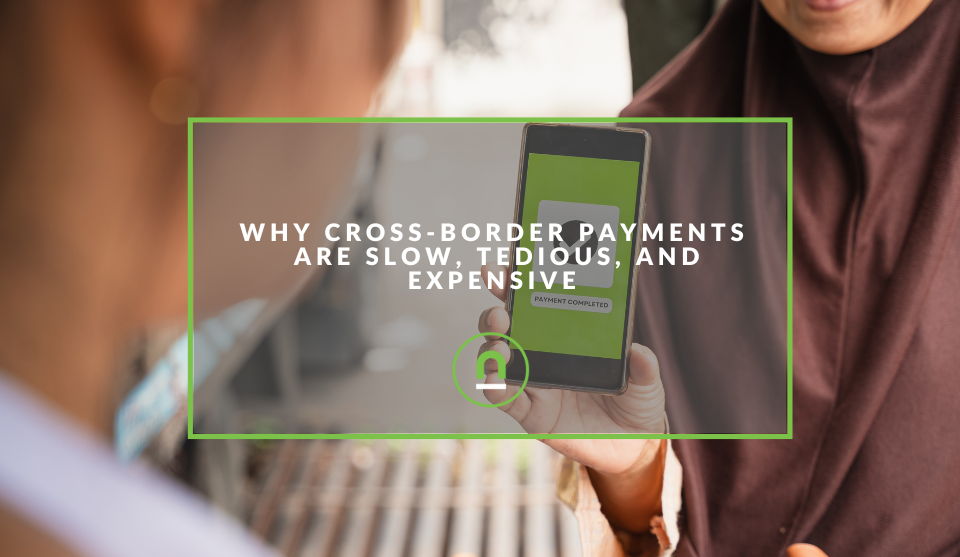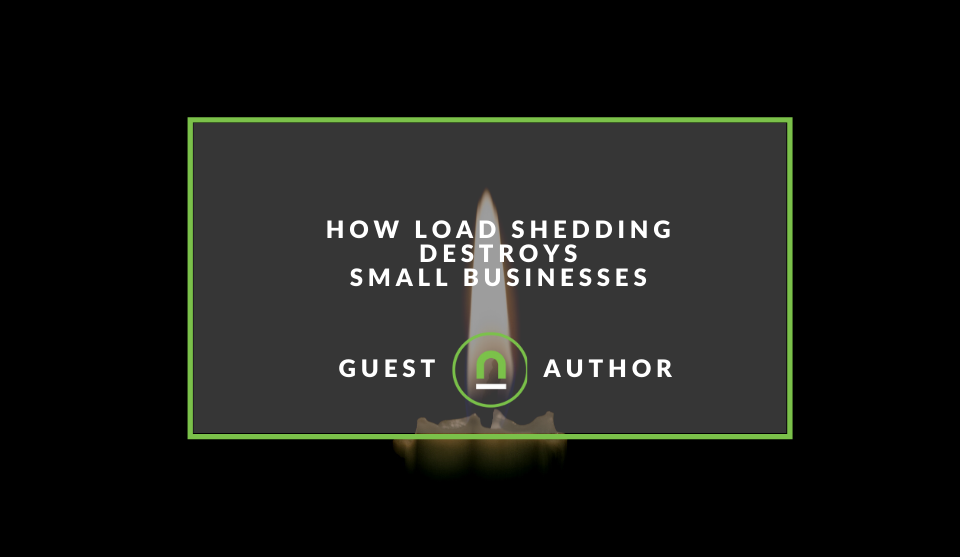Recent posts

Money Talks
Why Cross-Border Payments Are Slow, Tedious, and Expensive
17 December 2025

Money Talks
The Rise Of Trading Platforms In South Africa
16 December 2025

nichemarket Advice
The South African VAT Threshold Chokehold
05 December 2025

Doctors Orders
The Difference Between SOAP Notes and DAP Notes
02 December 2025
Popular posts
Extravaganza
Trending Music Hashtags To Get Your Posts Noticed
24 August 2018
Geek Chic
How To Fix iPhone/iPad Only Charging In Certain Positions
05 July 2020
Extravaganza
Trending Wedding Hashtags To Get Your Posts Noticed
18 September 2018
Money Talks
How To Find Coupons & Vouchers Online In South Africa
28 March 2019
How Load Shedding Destroys Small Businesses
28 February 2022 | 1 comments | Posted by Che Kohler in nichemarket Advice
Loadshedding is a pain South African businesses have had to live with and adapt to for over a decade and is showing no signs of slowing down; in fact, it feels like it's gotten progressively worse. We've had times of up to 6 hours a day shifts as we move up the stages. South Africans have been forced to adapt and continue; it doesn't tell the whole story of the ramifications and downstream effects.
Though estimates vary, it is generally thought that South Africa is home to 5.6 million small businesses – of which 3.3 million are survivalist businesses, 1.7 million micro-enterprises and 554 000 small enterprises. These businesses account for 28% of employment in South Africa.
These businesses have to survive in a stagnant economy, with unfriendly tax regulation poor or limited access to banking, all impacting margins. Then adding load shedding on top of that, for many, you're asking the impossible if you want them to survive.
Small businesses don't have the luxury of venture capital or angel investors backstopping them, selling equity to raise additional capital or raising funds through the bond market. The reality is using debt financed through the bank would most likely make things worse since the borrowing costs aren't very accomodating.
So they have to live within their means and try to find ways to cut costs or increase revenue by passing on the additional cost to customers.
Small businesses are more vulnerable compared to larger corporates.
Most small businesses rely on a constant daily income to cover running costs and salaries. When the power goes down, small businesses generally can't produce anything or do any work and generate that income. It is not income that is deferred but income that is lost forever, and there is no way to hedge against it.
Unlike larger businesses, they are also not in a position to postpone production or do double shifts the next day, use futures contracts to hedge production and get income upfront. This helps keep income flowing, and business operations don't seize up.
As for small businesses, many don't operate with sufficient runway, nor do they map out a monthly burn rate and often have insufficient income or cash flow to manoeuvre or afford a generator or solar and photovoltaic systems - let alone cover the fuel and maintenance costs of self-generation continually.
Existential threats mean more costs to operate.
Apart from the very real risk that load shedding presents to the commercial survival of small businesses, load shedding also presents a number of existential risks.
Spoilage, for example, is a big load shedding-associated risk, especially for restaurants, spaza shops, roadside food vendors or fruit and veg suppliers.
Another risk associated with load shedding is damage to alarm systems, either from run-down batteries or surges when electricity is restored, leaving you exposed to the threat of theft.
Job loss and operational decline
When you're income gets hit, you have no way to recover those lost sales or billable hours. Eventually, you'll need to consider streamlining. This can come in the form of cutting jobs, cutting suppliers and doing things in the house, reducing the number of services you provide and focusing on your core business.
No matter how you slice it, job cuts don't help the overall economy; the fewer people who have jobs, the fewer people have disposable income to be customers, and this does not only affect your business but suppliers and ancillary businesses in your market. It also affects downstream businesses that service your employees' needs, and the knock-on effect of job losses continue.
Passing on costs to consumers
Sadly most businesses have to stomach the cost, and when they can't, they have to pass it on to the consumer to pay bills and meet obligations. As energy prices rise and the amount of income-generating opportunities decrease, the ones that are around needed to be exploited for more income. These forces encourage businesses to raise prices and pass the pain they feel on to the consumer.
In some cases, it won't affect demand, but in other cases, your price rises my alienate certain customers, and you reduce your access to the market as fewer people are willing to pay for your services. Pricing is a mechanism small businesses will need to fine-tune in order to remain in operation.
Shrinkflation isn't an effective solution.
One way to reduce cost and keep customers if your pricing is rather sensitive in affecting demand is reducing your product quantity or quality. This may mean the hourly rate is now the same for 45 mins; this can mean 1 or 2 fewer items in a batch; this can mean using inferior ingredients or cutting costs on packaging.
These cuts aren't without their issues; as the quality of your product reduces, so too may your loyal user base erode as they feel they're not getting the same quality as before.
You are the best risk manager.
South African small business owners should examine what can go wrong in their business and then look at the costs involved. Use load shedding apps and assess the likelihood or frequency with which these blackouts can happen, and try to work within it. This may mean moving books and appointments, ordering stock at certain times, planning admin tasks at certain times over business and operational tasks and trying to get the most out of your time with electricity.
I know this is not comforting, but this is reality, and in South Africa, no one will come and save you.
Load shedding cutting more than just energy usage
Load shedding, without a doubt, is the boot on many small businesses' necks, and it doesn't look like it will let many of us breathe any time soon. The downstream effects continue to pile up and manifest in the form of crime unrest, and these are all negative-economic activities that destroy businesses as well as investor confidence.
Make no mistake; we are living on the shoulders of some of the most resilient business owners in the world, those doing whatever it takes to keep their doors open and service their community have to be applauded.
Contact us
If you would like us to help set up your marketing or want to know more about digital marketing for your business, then don’t be shy we’re happy to assist. Simply contact us
Are you looking to promote your business?
South African Business owners can create your free business listing on nichemarket. The more information you provide about your business, the easier it will be for your customers to find you online. Registering with nichemarket is easy; all you will need to do is head over to our sign up form and follow the instructions.
If you require a more detailed guide on how to create your profile or your listing, then we highly recommend you check out the following articles.
Recommended reading
If you enjoyed this post and have a little extra time to dive deeper down the rabbit hole, why not check out the following posts on small business
- How To Register A Small Business In South Africa
- How To Promote My Business For Free In South Africa
- Small Businesses That Can Go Digital During The Lockdown
- 14 Ways To Leverage Facebook As A Small Business
- How South Africans Can Kickstart Their Side Hustle
- How To Find A Suitable Buyer For My Business
- Create A Free Website For Your South African Business
Tags: Load Shedding, Small Business, SME
You might also like
The Rise Of Trading Platforms In South Africa
16 December 2025
Posted by Gabriela Pelayes in Money Talks
Discover how the rise of digital trading platforms in South Africa is reshaping commodity markets, boosting accessibility, efficiency, and the future...
Read moreWhat Is The Part Time Job WhatsApp Scam?
25 November 2025
Posted by Che Kohler in Alarming
A deep dive into the scheme behind all these random WhatsApp invites or Telegram chats offering you part-time remote work that pays you out instantly...
Read more{{comment.sUserName}}
{{comment.iDayLastEdit}} day ago
{{comment.iDayLastEdit}} days ago
 {{blogcategory.sCategoryName}}
{{blogcategory.sCategoryName}}

